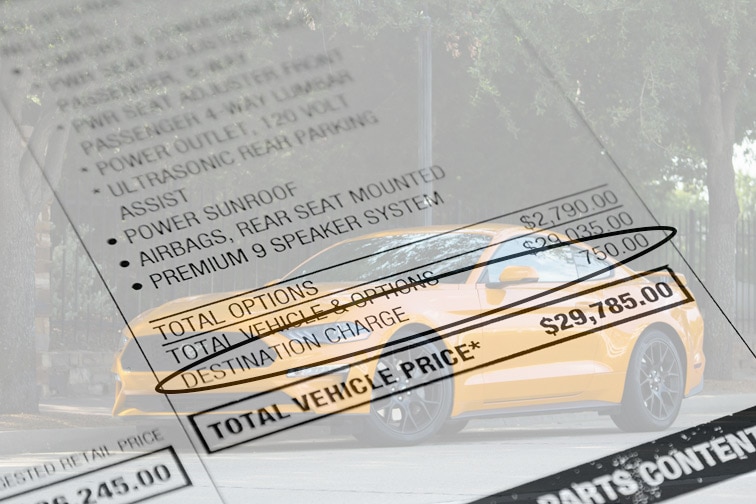What is a Destination Charge, and Do I Need to Pay It?
New car buyers should be aware of this fee, which can average around $1,000 but is often overlooked.
 Aaron Miller/Capital One
Aaron Miller/Capital One
Updated on December 19, 2019
A flurry of fees crop up in any new car purchase. Some, such as tax, title, and license (TT&L), you probably anticipate. Others, like
And then there’s one that occupies its own unique space as the car-buying equivalent of an annoying relative you have to invite to Thanksgiving dinner:
The destination charge shows up late, eats away at your pocketbook, and is ultimately unavoidable. It’s also part of a tradition that dates back more than 50 years.
WHAT IS A DESTINATION CHARGE?
Essentially, it’s a shipping fee that can range from
If you’ve seen one of those big transport trucks rumbling down the highway with eight or 10 shiny new rides strapped onboard, you’ve seen the destination charge in action.
The transports deliver new cars and trucks from the factories or a nearby port to local dealerships, and that costs money (hint: cargo ships are expensive). Automakers pass the expense on to consumers in the form of a destination charge.
IS THE DESTINATION CHARGE THE SAME FOR EVERY CAR?
No, fees vary based on the vehicle.
Decades ago, you could go to Detroit to pick up your shiny new vehicle as it rolled off the assembly line, and avoid the pesky destination charge. If you lived far away from the factory, you’d pay a higher destination charge than people who lived nearby.
In 1958, Congress passed the
For 2019 vehicles, average destination charges run between $750 and $1,000. Destination fees for heavier vehicles such as large trucks and SUVs can cost up to $1,700. Luxury vehicles can also have added cost to compensate for extra protection on their journey to the dealership.
DO I HAVE TO PAY THE DESTINATION CHARGE THAT’S LISTED, OR IS IT NEGOTIABLE?
Dealers are required by Federal Law to list the destination charge on the window sticker. It’s listed as a separate cost from building the vehicle and it is subject to sales tax. While dealers aren’t required to charge you the full amount, they almost universally do. Be sure to factor this charge into your price negotiations, and be clear you want to settle on an “out the door” price, which should include the destination charge.
Similarly, if you’re shopping for vehicles, check to see if the advertised price includes the destination charge. Many times it won’t.
DO CARS MANUFACTURED OUTSIDE THE U.S. HAVE HIGHER DESTINATION CHARGES?
No. The destination charge refers to the cost of shipping within the United States.
Foreign automakers may try to recoup some of the costs of shipping cars from overseas in the sticker price, but most don’t because they want to remain competitive in the U.S.
Audi, BMW, Mercedes-Benz, Porsche, and Volvo
IS THERE A DESTINATION CHARGE FOR USED VEHICLES?
No. A destination charge is for new cars only.
Most used cars are purchased at auction or from a private seller, or are coming off a lease. If there are transport costs, they’re minimal and dealers typically include them in the purchase price of the vehicle.
If you see a destination charge or delivery fee on your used-car paperwork, question it. You could save a few bucks.
Written by humans.
Edited by humans.
 Rick Press
Rick PressAfter a long career as an editor for a major metropolitan newspaper and website, in 2017 I joined Capital One as its Managing Editor for Auto Content. I’ve been fortunate to cover everything from breaking news and Super Bowls to CEOs and celebrities, and now I am excited to explore the connection we all have to our cars and help consumers navigate the car-buying journey. Let’s ride!
Related articles
View more related articles